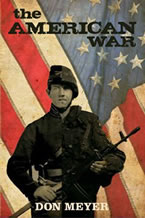Article first published as Book Review: The American War by Don Meyer on Blogcritics.
April 24, 2013
WINNER OF THE 2013 TYLER R. TICHELAAR HISTORICAL FICTION AWARD
The American War
Don Meyer
Two Peas Publishing (2012)
ISBN 9781938271007
Award-Winning Vietnam War Novel Has Supernatural Twist
 First let me say that I’m not one usually to read war novels, but a novel that alternates between scenes in the Vietnam War and the Civil War made me curious. And so did the description of The American War on the book’s jacket:
First let me say that I’m not one usually to read war novels, but a novel that alternates between scenes in the Vietnam War and the Civil War made me curious. And so did the description of The American War on the book’s jacket:
Imagine having been an infantry soldier in one of the helicopters being lifted back into the A Shau Valley...
or imagine having been a Union blue coat soldier, marching en echelon into the Shenandoah Valley...
now imagine having been that soldier in both campaigns.
Being a veteran reader, although not a war veteran, of course, I had all kinds of ideas how an author might pull off this similarity between the wars—most likely through reincarnation, although I have also often speculated about cellular memories from our ancestors, and since I have my own ancestors who fought in the Civil War, I was intrigued to find out how Don Meyer would tie these two wars together. For me, the mystery of how main character Sam Kensington can be in both the Civil War and Vietnam War is what made the novel most fascinating to me.
But just because The American War has its supernatural aspects, that doesn’t mean it is in any way lacking the gritty realism we expect from war novels. Sadly, having been born during the Vietnam War, it was too recent for me to learn much about it in school and the unpleasantness of it has kept me from wanting to learn more about it, although I can well imagine the agony our soldiers went through. I’m far more familiar with the Civil War. But as I read, I marveled at the descriptions of both wars in the novel, and as far as I know, they are both depicted to be historically accurate. I don’t know how Meyer managed to write the Civil War scenes, but as a Vietnam veteran, I’m sure his personal experiences colored his descriptions for that war in the novel. Not only does Meyer capture the terrain and events of the Vietnam War, but what I most appreciated was that he captured the camaraderie among the characters and wrote very realistic, tight dialogue.
I’ve sometimes found war novels a bit boring because they are lacking in plot—there’s no real drama among the characters in terms of relationships like civilians have, and that is understandable, for they are dropped into a war zone and all the conflict and concentration is geared toward fighting and defeating the enemy—there’s little space for romance, petty jealousies, and other personal dramas, etc. But Meyer makes the characters come alive, depicting friendships among the soldiers, bringing in racial issues between the white Sam Kensington and his black friend and fellow grunt, Wilson, as well as the issues of rank in the army among the various soldiers and their officers. There is no sentimentality here, but it’s clear through the dialogue Meyer writes that these soldiers care about each other, that they are frightened, that they have hope, and that often, more is left unsaid than is said.
In the end, I feel like The American War is a real testament not only to our soldiers and what they endure, but also a testament to the American soldier and especially families who have served our country through the military for generation after generation. Whatever else I might say will only fall short in trying to understand or explain what it must take to write a novel like this. As a historical fiction writer myself, I can only appreciate the effort, personal feeling, and research Meyer obviously put into it, and I’m sure it was cathartic for him. It should be noted that Meyer is also the author of a Vietnam War memoir, The Protected Will Never Know. I think that title says it all. We can’t know, but we can try to understand what the Vietnam War was for the people who fought in it by reading such novels, and we can be grateful for the sacrifices made. Sadly, Meyer’s main character Kensington never really comes to understand what it all means—fighting such a war—and he concludes, “But it don’t mean nothing.” Writing such a novel has to be difficult as an effort to find meaning in something that can’t easily fit into a neat definition or meaning, but that Meyer is able to accept that, rather than hold onto some false meaning, makes The American War all the better and more realistic and true despite the fanciful aspects of it, which in the end, only confirm that understanding—or lack of one.
For more information about Don Meyer and The American War, visit www.dpmeyer.com.
Read the SBP Interview with Don Meyer
— Tyler R. Tichelaar, Ph.D. and author of the award-winning Narrow Lives

